
Logos-Journal of the World Publishing Community
Scope & Guideline
Innovating Research Practices for a Digital Age
Introduction
Aims and Scopes
- Cultural and Historical Analysis of Publishing:
Explores the historical contexts and cultural significance of publishing practices, including studies on iconic publishers, bookshops, and literary movements. - Impact of Digital Transformation:
Investigates how digital technologies are reshaping the publishing industry, including the rise of audiobooks, online platforms, and social media's role in marketing. - Sustainability in Publishing:
Focuses on the pressing issues of sustainability within the publishing sector, analyzing practices and innovations aimed at reducing environmental impact. - Economic and Market Dynamics:
Examines the economic factors influencing the publishing industry, including trends in consumption, new business models, and the impact of global events. - Diversity and Inclusion in Publishing:
Addresses the challenges and opportunities related to minority-language publishing and equitable representation in the publishing landscape. - Editorial Practices and Roles:
Investigates the evolving roles of editors and their impact on the publishing process, including discussions on editorial identity and practices.
Trending and Emerging
- Sustainability and Environmental Impact:
Recent publications emphasize sustainability in publishing, exploring how the industry can adapt to climate concerns and promote environmentally friendly practices. - Digital Innovation and Social Media Marketing:
There is a notable increase in research on digital marketing strategies, particularly the use of platforms like TikTok and Bookstagram for promoting books and engaging readers. - Economic Resilience and Adaptation Post-COVID-19:
The journal is increasingly focused on how the publishing industry is navigating economic challenges brought on by the pandemic, including shifts in consumer behavior and business models. - The Role of Editors in Modern Publishing:
The exploration of editorial practices and their significance in the contemporary publishing landscape has gained traction, highlighting the evolving nature of the editor's role. - Cultural Narratives and Identity in Publishing:
Emerging themes also focus on how cultural narratives and identities are represented and negotiated within the publishing industry, reflecting broader societal dialogues.
Declining or Waning
- Traditional Print Publishing:
Research centered on traditional print publishing models has diminished, likely due to the increasing prominence of digital formats and innovations. - Audiobooks and Their Market Dynamics:
Although audiobooks were once a focal point, the frequency of publications specifically addressing their market dynamics has decreased, possibly indicating a saturation of the topic. - Minority-Language Publishing:
While still relevant, studies specifically focused on minority-language publishing have become less frequent, suggesting a potential shift towards broader inclusivity themes. - Historical Case Studies:
The focus on historical case studies of specific publishers or movements seems to have waned, as the journal shifts towards contemporary issues and digital transformation.
Similar Journals
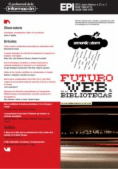
Profesional de la Informacion
Exploring Innovative Research in Cultural StudiesProfesional de la Informacion is a leading academic journal dedicated to advancing research in the fields of Communication, Cultural Studies, Information Systems, and Library and Information Sciences. Published by EDICIONES PROFESIONALES INFORMACION SL-EPI, this journal has established itself as a pivotal resource for scholars and practitioners alike since its inception in 2006, holding an impressive Q1 ranking across its categories in 2023. With an impactful presence reflected in its Scopus Rankings—33rd out of 511 in Communication and 26th out of 280 in Library and Information Sciences—Profesional de la Informacion provides a forum for innovative research and discussion. Although it operates under a subscription model, the journal’s commitment to quality research contributes significantly to the knowledge base within its fields, making it an essential read for those who are passionate about information and communication studies. Positioned in the vibrant academic landscape of Barcelona, Spain, this journal encourages submissions that explore contemporary challenges and advancements in these vital areas of study, solidifying its role as a cornerstone of scholarly discourse.

Research Integrity and Peer Review
Exploring the foundations of trust in academic publishing.Research Integrity and Peer Review is a pioneering open access journal published by BMC, dedicated to advancing the fields of research integrity and the processes underpinning peer review. With an E-ISSN of 2058-8615, the journal plays a critical role in fostering a transparent, accountable, and evidence-based research environment, vital for both scholars and practitioners in academia. Since its inception in 2016 as an open access platform, it has facilitated unrestricted access to high-quality research outputs, promoting widespread dissemination of findings relevant to ethics, methodology, and integrity in research practices. By providing a dedicated forum for discussions, critiques, and methodologies surrounding peer review and research integrity, this journal is positioned as an essential resource for researchers, institutions, and policymakers aiming to uphold the highest standards in scholarly communication.

LEARNED PUBLISHING
Championing Excellence in Publishing ResearchLEARNED PUBLISHING, published by Wiley, stands as a premier journal in the fields of Communication and Library and Information Sciences, boasting a notable impact in the scholarly community with its prestigious Q1 rankings in both categories. Established in 1996 and covering an extensive range of topics until 2024, this journal serves as a vital platform for academics and professionals, fostering knowledge and innovation in the realm of publishing practices and scholarly communication. With a strong emphasis on contemporary issues in publishing, dissemination of research, and the evolving landscape of information sciences, LEARNED PUBLISHING is essential reading for anyone engaged in these dynamic fields. Although it does not currently offer open access options, its rigorous peer-review process ensures that the research published is of the highest quality, thereby supporting the growth of knowledge in the global academic community.
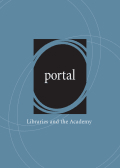
PORTAL-LIBRARIES AND THE ACADEMY
Bridging Gaps Between Information Access and Higher LearningPORTAL: Libraries and the Academy is an esteemed academic journal published by Johns Hopkins University Press, focusing on the intersection of library and information science, academic practice, and scholarly communication. With an ISSN of 1531-2542 and an E-ISSN of 1530-7131, this journal offers rigorous peer-reviewed research essential for librarians, researchers, and information professionals committed to enhancing academic libraries and fostering innovative practices in higher education. It holds a strong position in its field, ranking in the 61st percentile within Social Sciences and Library and Information Sciences, and categorized as Q2 in both Development and Library and Information Sciences for 2023. Though the journal is not Open Access, its content is invaluable for anyone interested in staying abreast of the latest trends and challenges in library services and academic environments. Since its inception in 2001, PORTAL has continuously contributed to the discourse on the evolving role of libraries in academia, making it a critical resource for those striving to bridge the gap between information access and higher education pedagogy.
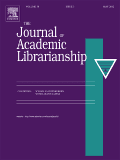
JOURNAL OF ACADEMIC LIBRARIANSHIP
Elevating Scholarly Dialogue in Library Sciences.JOURNAL OF ACADEMIC LIBRARIANSHIP, published by Elsevier Science Inc, stands as a premier platform for the academic library community, dedicated to advancing research and innovation in library and information sciences. With an impressive impact factor and recognized in the Q1 category for both Education and Library and Information Sciences, this journal is essential for scholars and practitioners seeking to stay abreast of the latest trends and developments in the field. Since its inception in 1988, it has fostered a vibrant dialogue through peer-reviewed articles, case studies, and empirical research, making significant contributions to the understanding of academic librarianship practices and policies. Although not an open-access journal, its robust distribution and visibility through Elsevier's extensive network ensure wide accessibility to its critical insights. With rankings in the 83rd percentile in both Education and Library and Information Sciences, JOURNAL OF ACADEMIC LIBRARIANSHIP continues to shape the future of the profession by engaging a diverse audience of researchers, educators, and students, thereby reinforcing its position as a cornerstone of scholarly communication in the information sector.
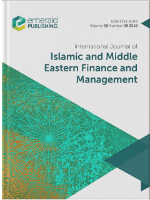
International Journal of Islamic and Middle Eastern Finance and Management
Pioneering Research at the Crossroads of Finance and Management.International Journal of Islamic and Middle Eastern Finance and Management, published by Emerald Group Publishing Ltd, stands as a pivotal platform for scholarly discourse within the fields of finance, management, and international business. Since its inception in 2008, the journal has continually contributed to the academic landscape, drawing attention from researchers and practitioners dedicated to understanding the complexities of Islamic and Middle Eastern financial systems. With an impressive Q2 ranking in 2023 across multiple categories—including Business and International Management, Finance, and Strategy and Management—the journal is recognized for its high-quality research, garnering a significant presence in Scopus rankings. While currently not an open-access journal, it offers comprehensive insights aimed at advancing theoretical and practical knowledge, making it an invaluable resource for students, professionals, and scholars alike. The journal's scope includes innovative studies that reflect the evolving dynamics of the global financial infrastructure, thereby fostering a deeper understanding of the intersection between culture and commerce.

Tekst Kniga Knigoizdanie-Text Book Publishing
Illuminating the Evolving Landscape of Media.Tekst Kniga Knigoizdanie-Text Book Publishing, an academic journal published by TOMSK STATE UNIVERSITY, focuses on the diverse and multidisciplinary fields of communication, library and information sciences, and media technology. Established in the Russian Federation, this journal serves as a vital platform for sharing innovative research from 2018 to 2024. Though registered under multiple categories, it notably ranks in the lower quartiles of its respective fields, including a Q2 position in Visual Arts and Performing Arts. The journal, with an ISSN of 2306-2061 and E-ISSN 2311-3774, aims to advance knowledge and foster dialogue in these critical areas, making it essential for researchers, professionals, and students seeking to delve deeper into the evolving landscapes of communication and media. Despite currently not being an open access journal, the insights presented within its pages contribute significantly to contemporary discussions and practices. With its commitment to academic rigor, Tekst Kniga Knigoizdanie is poised to impact its communities and beyond.
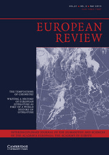
European Review
Fostering Interdisciplinary Dialogue for a Changing WorldThe European Review, published by Cambridge University Press, serves as a vital platform for scholarly discourse in the fields of Geography, Planning and Development as well as Political Science and International Relations. Since its inception in 1993, this journal has contributed significantly to the academic community, providing a comprehensive review of pivotal issues and emerging trends across Europe and beyond. With an impressive H-Index and ranking in the Q3 category for both Geography and Political Science as of 2023, the European Review is highly regarded among researchers and practitioners interested in interdisciplinary methodologies and innovative research approaches. Although it is not an open-access publication, it offers subscribers access to a wealth of meticulously peer-reviewed articles, making it indispensable for those striving to keep abreast of the latest developments in these dynamic fields. The journal's commitment to fostering knowledge exchange ensures its importance as a resource for students, professionals, and researchers alike.

New Proposals-Journal of Marxism and Interdisciplinary Inquiry
Engaging Minds in the Pursuit of Social Justice and UnderstandingNew Proposals: Journal of Marxism and Interdisciplinary Inquiry is a leading scholarly journal dedicated to exploring the intersections of Marxist theory and interdisciplinary studies. Published by New Proposals Publishing Society, this journal has been an open-access platform since 2007, making valuable research accessible to a global audience. Based in Vancouver, Canada, at the Department of Anthropology, University of British Columbia, the journal aims to advance Marxist thought and practice by fostering dialogue across various disciplines, including anthropology, political science, sociology, and cultural studies. The journal provides a critical forum for researchers, professionals, and students to disseminate their findings and engage with contemporary debates, thereby promoting a deeper understanding of socio-political issues through an interdisciplinary lens. With its commitment to rigorous scholarship and accessibility, New Proposals continues to be an essential resource in the field of Marxist studies.

SYDOWIA
Elevating Scientific Discourse in Ecology and Plant StudiesSYDOWIA is a prestigious academic journal based in Austria, published by Verlag Ferdinand Berger Sohne Gesellschaft mbH, that has been a cornerstone of scientific publishing since its establishment in 1996. With an ISSN of 0082-0598, SYDOWIA focuses on critical research in the fields of Ecology, Evolution, Behavior and Systematics as well as Plant Science, earning a notable classification in Category Quartiles with Q3 in Ecology-related disciplines and Q2 in Plant Science for 2023. The journal’s strategic insights into agricultural and biological sciences have secured a place within the Scopus rankings, where it holds the position of #191 out of 516 in Plant Science and #278 out of 721 in Ecology categories—reflecting its growing influence with a percentile standing of 63rd and 61st, respectively. Although SYDOWIA is not an Open Access journal, it continues to thrive in delivering scholarly articles that promote advancement and innovation in ecological and botanical research. Researchers, professionals, and students alike can rely on SYDOWIA as a vital resource for disseminating knowledge and fostering exploration in these essential scientific domains.